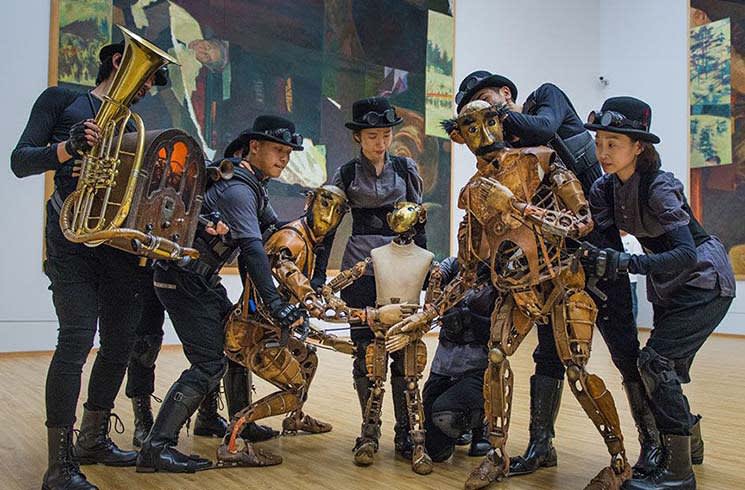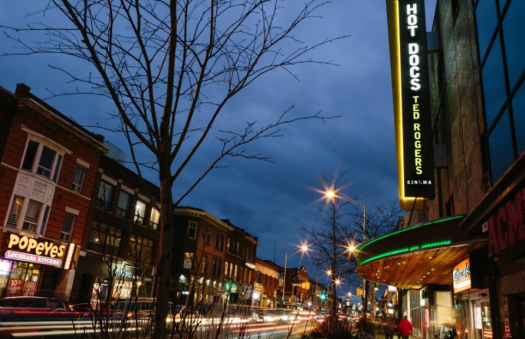What makes a work worth remembering? Worth not only being experienced by audiences in its own time and place, but to be talked about after? Documentaries abound examining great fundamental and notable works of art, satisfying curiosity on widely artists or discovering hidden gems. The wrinkle of Our Time Machine is in focusing on the story around a theatre piece that has to fight hard to live, and when it's seen through, can't eclipse or change the facts of the artist's life.
The film documents a cross section of Ma Liang's life around the creation of Papa's Time Machine, the photographer and visual artist's first foray into theatre. The move to the medium has significance for Liang; his father, Ma Ke, was a director with a distinguished career, helming over 80 productions at the Shanghai Chinese Opera Theatre. Liang is full of life, energized by his work; Ke, on the other hand, is suffering from Alzheimer's, his awareness of his surroundings slipping along with his memory.
With all this in mind, Liang starts creating Papa's Time Machine, a theatre project incorporating video work and most notably "mechanized puppetry." (The aesthetic can most easily be pegged to steampunk, gear, goggles and all.) He draws from his childhood memories to create a piece about a father and son connecting in their shared memories. The possibility teased is that Liang might still connect with his father in this essential, emotional way, in the space Ke's spent his life in.
Our Time Machine follows Liang's journey with an easy editing style, finding moments throughout this long period without too much intrusion. We cut easily from workshop to puppeteers and forward to a preview and onto Liang trying to drum up more money for the project. Through it all, the movie refuses to force a conventional plot on top of the story it's showing.
The ease of the storytelling is more remarkable, as this could be a sequence of events primed for conventional uplift or tragedy, depending on the path taken. The turn of the movie is that Liang's work doesn't light the world afire, eventually getting the theatre run he wanted without any great fireworks. The slow reveal gives the film time to dig into his personal journey with the work along the way. He started the piece to talk to his father, at least in part. While seeing it through, he's also considering what the value of this work is against actual time with family, all while considering the transitive value of all life.
The film isn't Liang's statement, having directors, editors and writers who aren't him shaping it. Those filmmakers, though, hold so tight on his story that the audience has to feel close to him and his work. Their explorations find a great vehicle in the life's journey of Ma Liang.
(Independent)The film documents a cross section of Ma Liang's life around the creation of Papa's Time Machine, the photographer and visual artist's first foray into theatre. The move to the medium has significance for Liang; his father, Ma Ke, was a director with a distinguished career, helming over 80 productions at the Shanghai Chinese Opera Theatre. Liang is full of life, energized by his work; Ke, on the other hand, is suffering from Alzheimer's, his awareness of his surroundings slipping along with his memory.
With all this in mind, Liang starts creating Papa's Time Machine, a theatre project incorporating video work and most notably "mechanized puppetry." (The aesthetic can most easily be pegged to steampunk, gear, goggles and all.) He draws from his childhood memories to create a piece about a father and son connecting in their shared memories. The possibility teased is that Liang might still connect with his father in this essential, emotional way, in the space Ke's spent his life in.
Our Time Machine follows Liang's journey with an easy editing style, finding moments throughout this long period without too much intrusion. We cut easily from workshop to puppeteers and forward to a preview and onto Liang trying to drum up more money for the project. Through it all, the movie refuses to force a conventional plot on top of the story it's showing.
The ease of the storytelling is more remarkable, as this could be a sequence of events primed for conventional uplift or tragedy, depending on the path taken. The turn of the movie is that Liang's work doesn't light the world afire, eventually getting the theatre run he wanted without any great fireworks. The slow reveal gives the film time to dig into his personal journey with the work along the way. He started the piece to talk to his father, at least in part. While seeing it through, he's also considering what the value of this work is against actual time with family, all while considering the transitive value of all life.
The film isn't Liang's statement, having directors, editors and writers who aren't him shaping it. Those filmmakers, though, hold so tight on his story that the audience has to feel close to him and his work. Their explorations find a great vehicle in the life's journey of Ma Liang.




